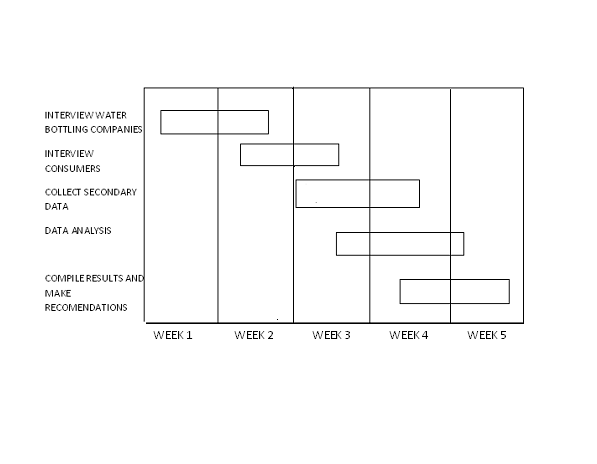Purpose
The project is intended to find out the impact of bottled water both environmental and cultural. In the past, people have believed that bottled water is superior to tap water and the research will provide evidence to support or oppose this claim. The study will determine the overall effects of bottled water and the results obtained will determine whether people should be encouraged or discouraged from consuming it (Senior & Dege, 2005).
The research will also be important in the implementation of other policies. Examples are the policies to do with disposal of bottles. If it is discovered that water bottles are ineffectively disposed leading to pollution, the study will assist in coming up with ways of ensuring that such pollution does not occur but instead that the bottles are recycled which will also save on resources.
It is evident that the recycling of water bottles is likely to compromise on the quality of drinking water by allowing phthalate into the water. By carrying out this project, it will be possible to come up with ways of ensuring that the environment is protected while at the same time guaranteeing consumers of quality drinking water.
There are a lot of fossil fuels that are required in the production of water bottler and the research will assist in finding out whether there exists more fuel saving methods of producing such bottles. There are many different issues that arise from bottled water and an analysis of all of them is important do determine the relevance of the water bottling industry in society (“Regulations of bottled water”).
Areas of investigation. The project will involve an in depth analysis of various factors that have to do with drinking water. The first issue is in relation to the cultural impact of bottled water. It will examine whether bottled water is actually of superior quality to tap water as well as water from other sources. The other area of study will be to determine, from bottled water companies, the proportion of water bottles that they actually recycle.
This will assist in determining the exact effect that water bottles have on the environment. A study will also be carried out on the consumers themselves to find out their attitude towards bottled water as well as whether they are aware of any differenced between tap water and bottled water. They will be interviewed on the measures that they take to ensure that their bottles do not form part of pollutants (LaMoreaux & Tanner, 2001).
Research method Primary data will be collected from companies that manufacture bottled water through interviewing various employees. Consumers of bottled water will on the other hand be provided with questionnaires to fill regarding diverse issues related to bottled water. The following literature will also be helpful in collecting and analyzing of secondary data:
- Goodman, S (2009). “Fewer regulations for bottled water than tap, GAO says”. NYTimes.com.
- Hall, N (2007). Federal and State Laws Regarding Bottled Water – An Overview and Recommendations for Reform. Web.
- Job, C. (2009). Groundwater Economics. Washington: CRC Press.
- Miller, G & Spoolman (2008). Living in the Environment: Principles, Connections, and Solutions. New York: Cengage Learning.
- Olson, E, Poling, D et al (1999). Bottled water: pure drink or pure hype? USA: NRDC “Regulations of bottled water.”
The research will require a budget of $1,000 to be used as follows: Interviews and questionnaires $500 Transport cost $100 Data analysis $300 Stationery $ 100.
Request for approval. Considering the importance of the project to individuals and the environment, approval to conduct it will be highly appreciated. The research findings will be accompanied by important recommendations whiGantt chart for the bottled water projectch if implemented will make the world a better place. The research will take four weeks as indicated in the chart below.
Gantt chart for the bottled water project

References
LaMoreaux, P. E., & Tanner, J. T. (2001c). Springs and Bottled Waters of the World. Springer Science & Business Media.
Senior, D & Dege, N (2005). Technology of bottled water. New York: Wiley-Blackwell.